We Asked for Science. We Got Sustain-a-Babble.
Editor’s Note
CASSE encourages members and readers to hold their government agencies to account on the conflict between economic growth and environmental protection. Last week, Brian Czech presented Gag-Ordered No More to the Canadian Association for the Club of Rome, concluding with recommendations for engaging agency directors. We follow up this week with a letter from the Qualicum Institute (British Columbia) to Canada’s Minister of Environment and Climate Change, The Honourable Steven Guilbeault, MP.
Canadian citizens can petition a Minister of the Crown via a Member of Parliament (MP). The minister must respond to each petition within 45 calendar days. In December 2022, MP Rachel Blaney, on behalf of the Qualicum Institute, petitioned Minister Guilbeault to acknowledge the conflict between economic growth and environmental protection, and to apply the principles of steady-state economics in the Ministry of Environment and Climate Change.
What follows is the Qualicum Institute’s rebuttal of Minister Guilbeault’s response. Headings were inserted by CASSE.
The Rebuttal Letter

Canada features many geographies of majestic beauty. (Trevor McKinnon, Unsplash)
To the Minister of Environment and Climate Change Canada:
The Qualicum Institute (QI) petitioned Environment and Climate Change Canada (ECCC) (Petition 441-01068—Environment. Editor’s note: The link also includes the Minister’s response to the petition.) to pursue a real solution—a move towards steady-state economics—to address the dangerous and escalating climate and biodiversity crises. Steady-state economics, grounded in science, is an economic model that respects physical and ecological limits. There are many experts across a wide array of disciplines who understand and know how to apply ecological economics and who can help keep humanity within the safe operating limits of planet Earth.
We believe it is your job and responsibility, on behalf of all Canadians, to assemble these experts to deal quickly and efficiently with the limiting factors of the climate and biodiversity crises: population and economic growth. Empower these experts and let them begin the transition towards a steady-state solution!
The escalating, threatening crises we face are the direct result of overpopulation, over-development, and ecological overshoot caused by the continued pursuit of economic growth. This isn’t an accident—economic growth requires never-ending expansion in order to grow GDP. It’s an economic model that doesn’t respect and isn’t grounded in physical or biological reality.
Specifically:
- Economic growth is an exponential function
- A 3% growth rate, the target rate of most governments, doubles the size of the economy, and thus resource and energy use, roughly every 23.5 years
- Physical and biological laws dictate that economic growth can only occur by liquidating the natural world on which we depend; absolute decoupling of resource use from GDP is a fantasy
- Scientific data show that exponential GDP growth is occurring lockstep with exponential resource use and climate and biodiversity breakdown. In fact, GDP is actually a measure of environmental impact—our collective ecological footprint—and not a measure of our well-being.
If the Canadian Government’s overarching goal is to grow the economy, then attending conferences, such as the climate and biodiversity Conferences of the Parties (COP), developing policies, protecting natural areas, signing agreements, and funding initiatives, won’t and can’t work. Truth in government matters and we don’t accept the sustain-a-babble provided in your government’s reply to us.
The Reality: Climate
For example, you wrote that “the 27th Conference of the Parties to the United Nations Framework Convention on Climate Change (UNFCCC), which took place in Egypt in November 2022, and the 15th Conference of the Parties to the United Nations Convention on Biological Diversity (CBD), which took place in Montreal in December 2022, have demonstrated the increasing global focus on these issues.”
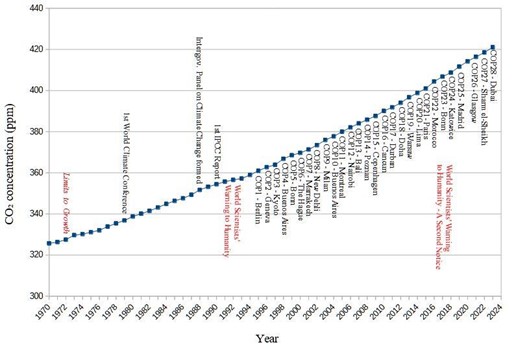
Figure 1. Annual mean atmospheric CO2 concentration levels from Mauna Loa Observatory, Hawaii, overlain with the various climate conferences, scientists’ warnings and, in particular, the formal United Nations Framework Convention on Climate Change Conferences of the Parties (COP) and their 28 Climate Change Conferences. (Qualicum Institute based on data from NOAA Global Monitoring Laboratory)
We are well aware of all the global meetings that have taken place over the years and the increasing global focus on the issue, which always appears to be of the highest concern. That is until you consider the resulting actions this so-called global focus has generated. Look at how effective these globally focused meetings have been (Figures 1 and 2)! Some focus! Some effective actions!
Despite the scores of climate meetings that have been held, there has been a continual increase in CO2 emissions (Figure 1). These emissions, and their relationship to economic and population factors, have been discussed in many IPCC reports over the years. But the 2014 IPCC report specifically identifies the primary drivers of emissions: “Globally, economic and population growth continue to be the most important drivers of increases in CO2 emissions from fossil fuel combustion. The contribution of population growth between 2000 and 2010 remained roughly identical to the previous three decades, while the contribution of economic growth has risen sharply (high confidence).”
In your response to us, however, you ignored our specific concerns and did not explain what the Canadian Government has done and is doing to address the two primary emissions drivers. In fact, neither economic growth nor population growth nor steady state economy appear in your response to our Petition yet those are the principle points we fully expected you to address!
The Reality: Biodiversity
Regarding the biodiversity crisis, you wrote, “The [Kunming-Montreal Global Biodiversity] Framework addresses the direct drivers of global biodiversity loss: land- and sea-use change; direct overexploitation; pollution; invasive species; as well as climate change given that we cannot solve the climate crisis without nature, nor can we solve the nature crisis without stabilizing the climate.”
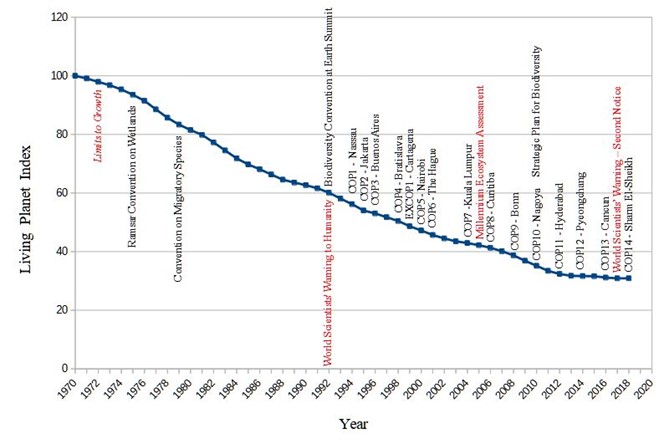
Figure 2. The Living Planet Index showing an average relative decline of 69% across the studied animal populations, overlain with the various biodiversity conferences, conventions, scientists’ warnings and, in particular, the formal Convention on Biological Diversity Conferences of the Parties (COP) and their 14 Biodiversity Conferences. (Qualicum Institute based on data from Our World in Data)
But—and we emphasize this—the Framework does not address the actual direct or primary drivers of global biodiversity loss according to the current science, which are, again, economic and population growth. The so-called “direct drivers” you mention are merely symptoms of continuous economic growth. As Pacheco et al. (2018) note, “economic growth is one of the two major causes of the environmental crisis, along with population growth.” They emphasize that “A transition to sustainability cannot be achieved if our economic system is not radically changed, simply because limitless economic growth is impossible within a limited planet.”
The myriad biodiversity meetings over the years that you speak of have paid off in similar results to the climate crisis meetings, in this case an average relative decline of 69% across the studied animal populations since the 1970s (Figure 2). Would you seriously call this “the successful conclusion of [any of] the COP or other such meetings”? We certainly wouldn’t.
You talk of “an ambitious goal” and that budget 2021 investments are setting the stage to support efforts to conserve 30% of land and waters by 2030. But we have known biodiversity loss was a major issue since at least the 1970s, so taking these small, gradual steps now is too little, considering what the science is telling us. Ecological studies have shown that at least 50% of all regional ecosystems need to be restored, preserved, and protected—both land and marine systems—in order to provide sustainable ecosystem services for humanity and all other life forms that share the planet with us. According to Dinerstein et al. (2019) it’s important we “protect at least half of Earth by 2050 and ensure that these areas are connected.” There is a “need to fast-track the protection and restoration of all natural habitat by 2030. A GDN [Global Deal for Nature] that will ensure that we have at least 50% intact natural habitats by 2030 is the only path that will enable a climate-resilient future and is one that will offer a myriad of other benefits.” Protecting only 30% is insufficient and doesn’t follow the science, especially at this late date when time is our least abundant resource.
Ditch the Myth of Absolute Decoupling, Move to a Steady State Economy
If the Government of Canada moves towards steady-state economics and addresses the primary drivers of the climate and biodiversity crises— economic and population growth—it would show Canada as a global leader in true sustainability and, more importantly, give humanity a chance of long-term survival. Then, many of the other actions you describe in your response might add up to make a difference. However, if the government continues to choose to ignore the primary drivers of the climate and biodiversity crises— economic and population growth—the good actions you describe will be overwhelmed and swamped by the exponential growth.
Moreover, we were totally confused by your statement that “Canada is one of many countries demonstrating strong economic performance while decreasing the GHG intensity of their economy.” This is the same decoupling myth that your government used in its reply to our initial petition to the Auditor General of Canada (No. 408 dated 27 May 2017). Since this seems to be your government’s attempt to allow the continuation of economic growth by attempting to decouple that growth from GDP, you might take notice that we debunked that possibility at length in our comments to your predecessor’s reply to that petition with Minister McKenna: Where is the Science? (Dawe et al. 2022).
While there has been some success in relative decoupling, in order to be sustainable, absolute decoupling must occur and that has not been shown to be possible. Hickel and Kallis (2020) found through “Examining relevant studies on historical trends and model-based projections … that: (1) there is no empirical evidence that absolute decoupling from resource use can be achieved on a global scale against a background of continued economic growth, and (2) absolute decoupling from carbon emissions is highly unlikely to be achieved at a rate rapid enough to prevent global warming over 1.5°C or 2°C, even under optimistic policy conditions. We conclude that green growth is likely to be a misguided objective, and that policymakers need to look toward alternative strategies.” Fletcher and Rammelt (2017) describe decoupling “as a ‘fantasy’ that functions to obfuscate fundamental tensions among the goals of poverty alleviation, environmental sustainability, and profitable enterprise that it is intended to reconcile. In this way, decoupling serves to sustain faith in the possibility of attaining sustainable development within the context of a neoliberal capitalist economy that necessitates continual growth to confront inherent contradictions.”
The Government’s Poor Performance to Date
Finally, we have noticed that the crises of climate change and biodiversity loss have all been handled by your government reluctantly and in an inefficient manner. There seems to be no understanding of the relevant scientific information. This seems to us due to the government’s pathological reliance on an economy dependent upon growth and debt at the expense of humanity and the other lifeforms on Earth. Your government has relied on a faulty human construct—neoclassical economics—designed not by scientists but by conventional economists.
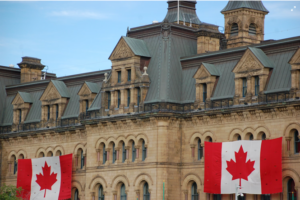
Parliament: Do the right thing for Canada and the planet! (Chelsey Faucher, Unsplash)
“Neoclassical economics does not even acknowledge the costs of environmental problems and the limits to economic growth, [and thus] it constitutes one of the greatest barriers to combating climate change and other threats to the planet” (Nadeau 2008). The assumptions of neoclassical economics are inconsistent with reality and the current science and fail to recognize that the global and local economies lie within the biosphere and its limits (Moldan, Janoušková, and Hák 2012; Rockström et al. 2023). As Kosoy et al. (2012) point out, “The simple, but to many unthinkable, fact is that you cannot get to a flourishing or even sustainable Earth if you start with the assumptions of neo-classical economics.”
The climate and biodiversity crises are global issues and both have been driven to the crisis point by governments engaging in confirmation bias and clinging to the demonstrably false human construct of economic growth, a construct facilitated by population growth and growth in per capita consumption. We cannot see any improvement regarding either crisis without dealing with economic growth. This would entail, among other things, going through a period of degrowth of both population and consumption as we move towards a steady state economy, an economy in balance with the regenerative and assimilative capacities of the biosphere. Listening further to conventional economists who, in no small way, have brought us to this point, rather than ecological (not environmental) economists, will only exacerbate the crises, leading us in the direction of a 4° C global temperature anomaly and leaving us with a depauperate planet, where many species, including perhaps humans, cannot survive.
If we ever hope to have a sustainable society, governments must follow the science and commit to a solution that lies within the physical and biological laws of the universe. As our leaders, we fully expect the Canadian Government—especially ECCC—to respect and be led by the science and to support a move towards the only truly sustainable solution to these crises: a steady state economy.
Can you make this commitment?
Sincerely,
Neil K. Dawe, President and Terri D. Martin, Secretary
On behalf of the Board of Directors
Qualicum Institute https://qualicuminstitute.ca/
Neil K. Dawe is President, and Terri D. Martin is Secretary, of the Qualicum Institute in British Columbia.

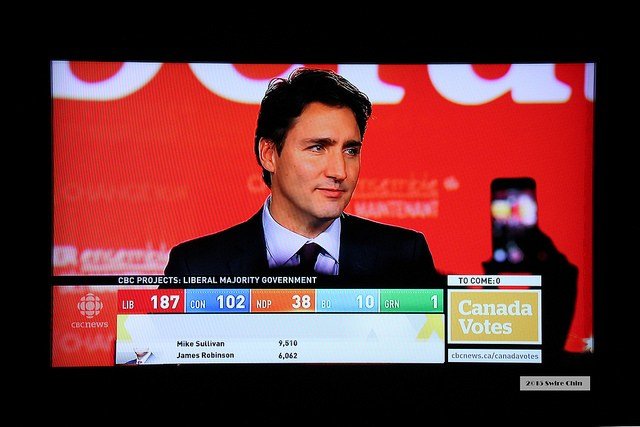
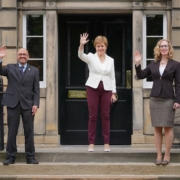






I read the article above with great interest. It would be significantly easier to follow if Guilbeault’s letter was also shown, or at least a link to it provided. As it is, his responses may/may not have been taken out of context. I sincerely hope not.
Thank you. Note that the Minister’s original response is included in the first link of the letter. I have added a note clarifying this for readers.
Thank you for the two graphs clearly demonstrating the correlation between rising CO2 levels, declining biodiversity and sustainababble (love that word) conferences over time!
Yes, I agree with the usefulness of posting Minister Guilbault’s response letter.
I think it might be very useful to engage The Conservative Party’s Shadow Minister of the Environment, Gérard Deltell, in this discussion.
His stance may be more important than that of the Liberals under Guilbault, when Canadians soon decide to “kick the bums out.”
If you believe that a conservative government will be more amenable to addressing the concerns raised by continuing to base our economy on a classical economic model dependant on perpetual growth your are deeply deluding yourself.
Thank you for making the effort you are making to try to draw attention to the delusional fantasy that an economic model based on perpetual growth is possible on a finite planet. The point about the exponential nature of our current model is key. Unfortunately the human mind does not grasp the concept of exponential growth easily on its own and we make no where near the appropriate effort to train it to do so. For generations we have mortgaged our children’s future to satisfy our own immediate greed for more. We have created a world where the idea of having enough is looked upon as a radical communist plot to rob us of our freedoms. We can choose to live within the limits of this planet’s ability to sustain life or we can stumble forward willfully blind to the obvious error of our ways as we are currently doing and the planet will take care of the problem (us) on its own. There is no place for humanity or the rest of life we share this magnificent place with to run (sorry to burst your bubble Elon). It may not yet be too late to change our ways but our history does not suggest we are likely to do so in a timely manner. Shame, shame, shame on us for continuing to subordinate reason to greed and power.
I don’t think the “Shame, shame, shame”. carries much weight
as an enlightenment path for those sitting at the levers of power.
The psychological characteristics of those sitting in those positions
all to often seem to exhibit some form of traits described in DSM-5.
The corporate capture of supposedly democratic governance is just
one element of many elephants in the room and no real fixes at this
point are in sight; Democracy on exists in Merriam Webster.
I don’t think greed can explain the apparent inability of our leaders to come together in some of consensus about what needs to be done about mankind’s effect on the environment. But, I do agree that some form of “delusion” is at play. What would it take to transition to ecologically conscious world order? In view my it would mean transitioning from our current capitalist( competitive, commodity based, for profit) market which is the de facto basis of our political system( radical plutocracy) which gives the individual the illusion of freedom in what he/she/they can possess and do given the ability to accumulate and concentrate financial power in the form of money to a local community based democracy. Is this possible? Yes; but we can’t look to our leaders, those who are in power, to lead this transition. We, at the local levels have to do the job. But, we need to come up with the nuts and bolts to do it( fortunately, they do exist); generative ideas follow action.
I followed the link to the original letter to the government with the government’s reply with no problem. Yes, the government replied in techno-babble, but actually did the best they could under the circumstances. Even if the wanted to navigate to a steady state economy, they would not have a path – clear OR muddy – to do so. Major economies are ALL currently structured to tank if they so much as lower the rate of growth, and tanking would throw everyone involved in the policy making out of a job. Furthermore, our international system is structured such that everyone has to outcompete the other national level bullies in their international bloc. If the US transitioned to a steady state, low consumption economy, just imagine what Russia would feel emboldened to do. All parties are caught in a systemic web of interconnections that freeze all relationships in place with lessening degrees of freedom and increasing rigidity.
Francis of Assizi had the marvelous insight that as long as a body (human, community, kingdom) has wealth, they are compelled to set up a military to defend it. Having experienced the hell of war, he decided that the only way out of that hell was to renounce wealth. Wealth could be defined as stored surplus, an artifact of the agricultural revolution. So Francis began a life as an itinerant worker, working only for his daily bread.
Unfortunately, a nation cannot so give away the wealth it literally sits on, and so remains vulnerable to invasion and conquest if it shows any sign of weakness in the dominance extraction international culture. Better minds than mine are seeking ways out of this trap, and I have yet to see a viable one. What us mortals perceive as greed is usually no more than fear cloaked in the trappings of power. Those trappings aren’t called “trappings” for nothing.
Thank you Robin for your thoughtful comment. We’ve been reflecting on your thoughts.
Agreed that there are others out there seeking ways out of the economic growth collapse trap. Our rebuttal letter applauds those efforts and encourages the government to pay attention to the experts aligning their ideas for policy change with ecological economics.
Will it be hard? Absolutely.
But, with the many warnings coming from the scientific community about the serious nature of ecological overshoot – humanity has grossly transgressed six of nine planetary boundaries – it feels important to keep pushing governments, world leaders, conservation organizations, neoclassical economists, planners and their consultants to stop peddling dangerous stories and lies. They are actively building collapse at break neck speed. It takes a certain effort to peddle, craft, promote, lie, delude yourself and others, finance, sell, pass regulations etc and so on to do this, all in the wrong direction.
As such, we do not feel that the government’s reply “was the best they could do under the circumstances.”
Efforts to point out the obvious may be futile against their trappings of power, but we’d rather put the effort in that direction than apply the effort to help cover it up. The outcome of staying on the current economic growth path we are on guarantees collapse and maximizes human suffering.